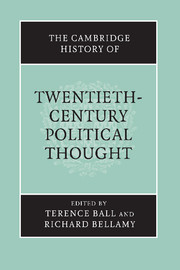Book contents
- Frontmatter
- Editors’ introduction
- Part I The changing fortunes of liberal democracy
- Part II Varieties of Marxism
- Part III Science, modernism and politics
- Part IV New social movements and the politics of difference
- 22 Pacifism and pacificism
- 23 Feminisms
- 24 Identity politics
- 25 Green political theory
- Part V Beyond Western political thought
- Biographies
- Bibliography
- Subject index
- Name index
- References
24 - Identity politics
from Part IV - New social movements and the politics of difference
Published online by Cambridge University Press: 28 March 2008
- Frontmatter
- Editors’ introduction
- Part I The changing fortunes of liberal democracy
- Part II Varieties of Marxism
- Part III Science, modernism and politics
- Part IV New social movements and the politics of difference
- 22 Pacifism and pacificism
- 23 Feminisms
- 24 Identity politics
- 25 Green political theory
- Part V Beyond Western political thought
- Biographies
- Bibliography
- Subject index
- Name index
- References
Summary
Three characteristics of identity politics
‘Identity politics’ came into vogue in the late twentieth century to describe a wide range of political struggles which occur with increasing frequency and constitute one of the most pressing political problems of the present. The range of political activities ‘identity politics’ refers to comprises struggles over the appropriate forms of legal, political and constitutional recognition and accommodation of the identities of individuals, immigrants and refugees, women, gays, lesbians, linguistic, ethnic, cultural, regional and religious minorities, nations within existing nation states, indigenous peoples, and, often, non-European cultures and religions against Western cultural imperialism.
The forms of recognition and accommodation sought are as various as the struggles. Feminists, gays and lesbians demand formal and substantive equality and equal respect for their identity-related differences, in opposition to dominant patriarchal and heterosexist norms of private and public conduct. Minorities seek different forms of public recognition, representation and protection of their languages, cultures, ethnicities and religions. Immigrants and refugees struggle not only for the rights of citizenship but also for freedom from assimilation to a dominant culture and language; for culturally sensitive modes of integration. Various models of regional, federal and confederal forms of self-government are advanced by suppressed nations and indigenous peoples within existing constitutional states. Nation states in the Arab and third worlds aim to overcome the continuing Western cultural imperialism of the international system of nation states and of the processes of globalisation. Many of these demands are not only for legal, political and constitutional recognition within existing nation states, but also in supranational associations such as the European Union, international law, the United Nations and by the creation of novel ‘subnational’ and ‘transnational’ institutions.
- Type
- Chapter
- Information
- The Cambridge History of Twentieth-Century Political Thought , pp. 517 - 533Publisher: Cambridge University PressPrint publication year: 2003
References
- 10
- Cited by

